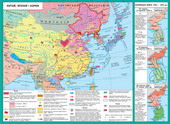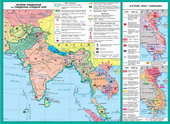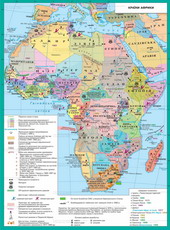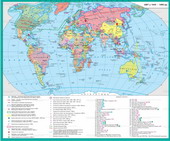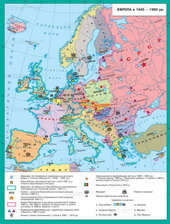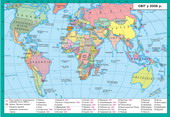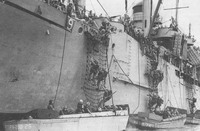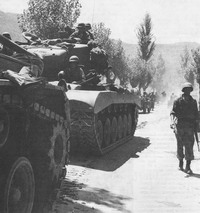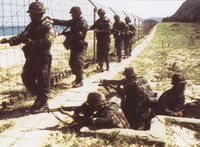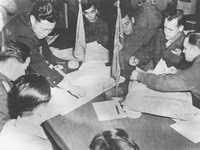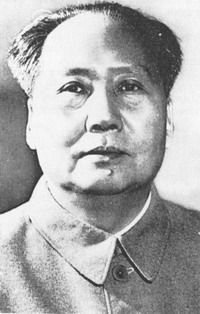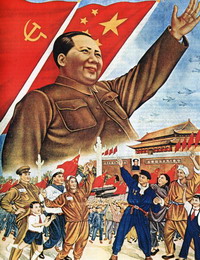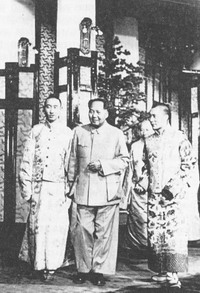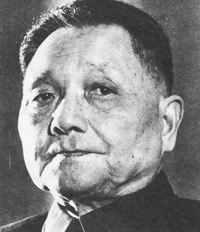§ 37. Countries in Africa
1. Decolonization of Africa
After the Second WorldWar in Africa turned the process of decolonization. To the end60's almost all African countries became independent. But the peace theynot occurred - began a long civil war, the interstateconflicts.
Top 70's onlyPortugal maintained their colonies in Africa: Angola, Mozambique,Guinea-Bissau and others. Long-term guerrilla war, international pressurepublic. Revolution 1974 Portugal opened the way for these countries toindependence.
Decolonization of Africa
|
Metropolis
|
Year competition (provision) Independence
|
Country name
|
|
United Kingdom
|
1951
|
Libya (since 1943 was under the joint authority in England and France)
|
|
1956
|
Sudan
|
|
1957
|
Ghana
|
|
1960
|
Nigeria, Somalia
|
|
1961
|
Tanganyika (Tanzania after the unification of Zanzibar), Sierra Leone
|
|
1962
|
Uganda
|
|
1963
|
Kenya, Zanzibar
|
|
1964
|
Northern Rhodesia (Zambia), Nysaland (Malawi)
|
|
1965
|
Southern Rhodesia (Zimbabwe from 1980)
|
|
1966
|
Bechuanalend (Botswana), Lesotho
|
|
1968
|
Swaziland
|
|
1990
|
Namibia (was occupied by South Africa)
|
|
|
|
|
France
|
1956
|
Morocco, Tunisia
|
|
1958
|
Guinea
|
|
1960
|
Mali, Niger, Chad, Central African Republic, Togo, Benin, Cameroon, Gabon, Dahomey, Upper Volta, Ivory Coast, Congo, Mauritania, Senegal, Madagascar
|
|
1962
|
Algeria
|
|
1977
|
Djibouti
|
|
Belgium
|
1960
|
Congo
|
|
1962
|
Burundi, Rwanda
|
|
Portugal
|
1973
|
Guinea-Bissau
|
|
1975
|
Angola, Mozambique, Cape Verde, Sao Tome and Principe
|
|
Spain
|
1968
|
Equatorial Guinea
|
|
1974
|
Western Sahara (Northern part occupied by Morocco since 1976)
|
In Africa, the only remaining areawhose status is still not defined. This former Spanish colony - WestSahara. Claim to this territory of Morocco. Is the movement against the occupationPOLISARIO, leading a guerrilla struggle.

2. Southern Africa
Most developed countriesSouth Africa and the continent in general are South AfricaRepublic.
South Africa(NAC) was established in 1961 The basis was the apartheid policy.A white minority of South Africa awarded the exclusive right to rule in the country and people of other races(Black color) were considered second-class people. Decolonization of Africasignificantly changed the situation of South Africa. People apartheid realized that the newly independentStates will not tolerate existing in the South African racist regime andmobilize the world community to fight it. To save the profilecarried out the following measures:
- Created independentindustry and military industry, in terms of international isolationresulted in failure of some sectors of the economy and artificially drive up prices andetc.;
- Attempts to create a northfrom South Africa with the safety belt of Angola, Mozambique, the Portuguese colonies;
- Developed its own atomic weapons.
Mode police got rice.Government was allowed to evict Africans from any area of the country. Wereprohibited marriages black and white. Banned anti-racism organization,including the African National Congress (ANC), whose leaders in 1963was sentenced to life imprisonment. Government tried to separate the white and black population.To this end, South Africa created bantustany for Negro population -isolated state in the country with the government. 1981 inbantustanah that occupied 13% of the country, inhabited by 75% of the population.
But all these measures failed: Could nota safety belt, the African population showed no humility andused all means of struggle. In the white community there has been a split: the majorityit began to advocate for political reform and the creation of multiracialdemocratic state. The first step in this direction was the adoption of newConstitution 1984 In 1989 to power in South Africa came Frederick deClerk. He made reforms that led to the fall racist regime. In1993 first time in South Africa held free elections. President of the country's blackNelson Mandela - ANC leader.
Angola. January 15, 1975 leaders of major factions that fought againstcolonialists in Angola (MPLA, UNITA, FNLA), signed an agreement on the establishmenttransitional government and holding general elections. January 31, 1975 suchgovernment was created. But, not satisfied with the distribution of power, UNITAprovoked a civil war. In the struggle for power UNITA and FNLA pooledits efforts and appealed to South Africa. In October1975 united army UNITA, FNLA and South Africa launched an offensive oncity of Luanda. In these difficult circumstances, MPLA leaders turned to Cuba. On the night of 4on November 5, 1975 F. Castro decided to send to AngolaCuban troops. Cuban forces managed to stop the offensive and crush the forcesaggressor. November 11, 1975 Ahostyno Neto, leader of the MPLA, declaredindependence of the People's Republic of Angola. Angola has a socialist orientation.Soviet Union provided economic and especially military aid, but it wasineffective. The long war, and periodic forces raids from the territory of the Republic of South AfricaAngola put the country to the brink of disaster. In 1988 signed"The principles of peaceful settlement in South-West Africa", under which South Africaprovided the independence of Namibia and Cuba would bring the troops from Angola.
In 1989 Government of Angola madeattempt to destroy UNITA, but the attack failed and the Government of Angola agreed tonegotiations. Civil war has struck the country in loss of 25 billion dollarsU.S. foreign debt rose to 11 billion dollars. May 31, 1991 ® ZE showerSantos - Chairman of the Government of Angola and J. Savimbi - leader of UNITA signed inLisbon Agreement for Peace and holding national elections, which wereconducted in 1992 The victory got the MPLA. UNITA did not agree with thatdevelopments and undertook weapon. Civil war continued for anotherten years. Since 1999 communities suffer defeat UNITA has lostits key areas. February 22, 2002 Savimbi was in the environment anddied. After zahypeli UNITA leader, who sought only the absolute powercountry finally came to a peaceful life. But the Thirty Years' War to piecesdevastated country.
A complicated situation has arisen in Southern Rhodesia (Zimbabwe). There lived a significant white minority, mainly farmers.White, 1965 Rhodesia declared independence and sought to createPower South Africa (white minority declared their exclusive right to power - standbyapartheid - racial discrimination). Neither Britain, which once belongedRhodesia nor the UN has not recognized this independence, Africans (black majority)launched armed struggle against the white community. Once isolated, white in1979 sat down with the Africans to the negotiating table. It was developed a newconstitution, which recognized the equality of races, based on it, elections were held andproclaimed a new state - Zimbabwe.
The lastterritory, which gained independence, was the former South-West Africa (Namibia), The mandate of management which wastransmitted Union of South Africa after the First World War. PASS (laterNAC) has tried to annex all the territory. Africans in 1966began an armed struggle for independence, which announced SVAPO organization. UN1973 South Africa denied the mandate for the territory, and in 1977 wasadopted a resolution on the withdrawal of South Africa. Only in 1989 South Africarealized the hopelessness of a hold on Namibia. It has anotherstate in Africa.
3. CountriesTropical Africa
Development of Tropical Africawas the most difficult. At the time of the conquest of these countries independence,general population was engaged in traditional sectors of the economy whererodopleminni dominated relations. Attempts to destroy the traditional life hadserious negative consequences. Upon applying for full independence, the leaders soughtreduce the role of agricultural and commodity exports, which finallyundermined the economy of these countries and deprived them of the only stable source ofprofits. The only thing which had the country's success Tropical Africa, however, is to createtyrannical regimes, as pro-Soviet and pro-Western.
Great ratespopulation growth nullify all efforts to overcome backwardness.Food production could not keep up in increasing numberspopulation, leading to periodic famine, which unosyv millions of lives.In Africa hunger constantly amaze epidemic serious illnesses.
Instability in the region amplifiedthrough the artificiality of African boundaries. To prevent border disputes,African countries have agreed to follow the principle of respect for existing bordersenshrined in the Charter of the Organization of African Unity (OAU, created in May1963). However, this does not prevent internal and interstateconflict.
Major conflicts in Africa
|
Years
|
Country Events
|
|
1952-1960
|
Mutiny movement "Mau Mau," in Kenya
|
|
1954-1962
|
National liberation Algerian struggle for independence
|
|
1955-…
|
Struggle Christian population in southern Sudan
|
|
1960-1965, 1977-1978, 1997-…
|
Civil War Democratic Republic of Congo (Zaire - 1965-1997), separatist movements, interference neighbors, European countries, USSR, USA
|
|
1961-1975
|
Revolutionary War Angola
|
|
1962-1973
|
Revolutionary War Guinea-Bissau
|
|
1963-1975
|
Revolutionary War Mozambique
|
|
1963-1967
|
The war with Somalia Kenya
|
|
1964-1968, 1977-1978
|
War in Somalia Ethiopia
|
|
1964 (1972) –1979
|
Civil War (The war of white and black communities) in Rhodesia
|
|
1966-1989
|
The struggle for Namibia independence
|
|
1967-1970
|
Civil War Nigeria. Trying to create the South Biafra independent state
|
|
1968-1971, 1976-1990
|
Civil War Chad, intervention in the event France and Libya
|
|
1975-2002
|
Civil War Angola. Interference in the event of the USSR, Cuba, South Africa
|
|
1975-1995
|
Civil War Mozambique. Intervention in the USSR and South Africa Events
|
|
1978-1979
|
The war between Uganda and Tanzania
|
|
1988-1989, 1993-1994
|
Civil War Burundi
|
|
1959, 1990-…
|
Civil War Rwanda
|
|
1989-2003
|
Civil War Liberia
|
|
1989-…
|
Civil War Somalia
|
|
1991-2000
|
Civil War Sierra Leone
|
As a result of colonial divisionAfrica 44% of the state border lies along the meridians and parallels, 30% of direct androunded lines and only 26% of the border settlement of ethnic groups. 13 statesis landlocked, which means that they have no reliable ways to shortcutwith the outside world. These artificial boundaries to the fact that Africa was notodnonatsionalnyh and mono States (except Somalia - but itdivided into clans). This situation leads to ethnic conflicts amongAfrican States. One of the bloodiest conflicts took place in Rwanda. Hisvictims were 800 thousand people.
Conflicts arose on religiousground between Christians and Muslims. In Ethiopia, after a long civilWar was declared an independent state erythro. Conflicts often beyond thestate boundaries, developed into interstate collision.
Yes, Somalia in 1977presented the territorial claims in Ethiopia claims to areas inhabitedtribes ethnically close to the Somalis. The war lasted almost a year. USSRbefore the war supported the regime as MH Mariama in Ethiopia who came topower in a coup in February 1974, and S. Barre in Somalia.During the war the Soviet Union was opened at the side of Ethiopia, and gave her support. Somaliapenetrated into the sphere of U.S. influence.
In the 80 years Libya has openedentered the ethnic conflict in Chad. She claimed a part of the territorycountry. To prevent the spread of influence of Libya, Chad, France has sent in theirtroops. Libyan troops suffered defeat, and the International Court recognizedLibya's territorial claims baseless.
Motley ethnic composition ofmaintaining relations rodopleminnyh begat another feature of political lifeAfrican countries - traybalizm.
Traybalizm - tribal orethnic separatism in society. In practice it means that allsocio-economic relations refracted through rodopleminni, ethnic.Political parties are created along ethnic lines, seeking to conduct business only withtribesman.
One feature ofAfrican continent was the existence of military dictatorships andmilitary dominance in the socio-political life. The reasons for this phenomenonInside:
- Incompleteformation processes of African societies;
- Relativelyshort period of independent development of African countries;
- Difficultinterweaving of different types of economic relations;
- Weaksocial class differentiation;
- Remainsrodopleminnyh relations;
- Wide rangeideological views of the population;
- Economic andpolitical dependence on developed countries;
- The availability of suchsocial phenomena as hunger, poverty, disease, illiteracy, low politicalculture.
External causes related toconfrontation of the USSR - the United States during the Cold War.
Military dictatorships inAfrica are characterized by political and economic instability, violence,number of civil rebellion, ethnic contradictions, wars, arms races(On arms spent 5% of gross domestic product in South Asia -3,6%, Latin America - 1,6%), growing political role in the Armysociety, dictatorial methods of government corruption.
Power dictator usuallybased on three political institutions: state, inherited from the colonizers,which provides a rigid centralized authority to manage the society;one-party system, the armed forces. Dictatorial regimes preventeddemocratic transformation in society and hampered social progress inAfrican countries.
Military dictatorships 60 80twentieth century. can be divided depending on their orientationpravoavtorytarni and livoavtorytarni.
Pravoavtorytarni regimes in establishingin Zaire, Central African Republic (CAR), Sierra Leone, Chad, Liberia,Rwanda livoavtorytarni - in Ethiopia, Libya, Mali, Angola, Mozambique.
J. B. Dictator Bokassa came topower in the Central African Republic in 1966 as a resultoverthrowing the State and ruled the country for 13 years. He declared himselfMarshals and Life President, and subsequently declared a republic an empire, andhimself emperor. For years he usuvav board positions with all potentialcompetitors, sent them out of the country areshtovuvav, subjected medievaltorture.
Idi Amin Dada in the Republic of Uganda"Famous" mass killing. For eight years in office in70 years the country has destroyed 800 thousand persons.
Congo(Zaire). Congo gained independence in 1960 But itin the country erupted into civil war. The leader of the national liberation strugglePatrice Lumumba was murdered. After a bloody civil war in the early 60'syears, which were involved neighboring countries, leading countries, the UN countryestablished itself in power charismatic leader Apparently Bangui. Over 30 years heruled the country (renamed the Democratic Republic of Congo to Zaire).Under the constitution drawn up by him in the country there is only one political partywhich are automatically enrolled population. During the years of his ruleZaire from the rich countries became one of the poorest: its foreign debtreached 8 billion U.S. dollars. But he probably in Swiss banks held 5 billiondollars. At the end of 90 years exacerbated the situation in the country, against the regimeApparently deployed massive insurgency. In 1998, his regime wasoverthrown, he fled dictator (soon died of incurable disease). To powercame opposition forces led by Laurent Kabiloyu. It was returned to the previousname of the country - Democratic Republic of the Congo, the reforms began,however, they turned to a new redistribution of property in favor of the forces thatcame to power. In a country with a bang erupted into civil war, whichevolved into zahalnoafrykansku for control of DRC natural resources. Inwas attended by troops of 10 countries. In 2001, Kabila was killed in shootoutwith his defense minister, whom he tried to dismiss. At the present daysituation in the country remains unstable. The ongoing conflict since 1998,left more than 2.5 million people.
У Ethiopia the coup d'
One of the most developed countriesTropical Africa is NigeriaThattrying to play a leading role on the west coast of Africa. Mainrevenue of the country - oil. The country inhabited by various peoples thatdiffer more and religion: in the north - mostly Muslims in the south- Mostly Christians. In 1960 The former English colony receivedindependence. The most advanced, oil-rich south of Nigeriainhabited mainly imbo people, declared its independence and the creationRepublic of Biafra. But the central government was unwilling to accept the loss andWar broke out (1967-1970 biennium). The separatist movement was suppressed inwar killed about 1 million Nigerians. To eliminate the cause of separatismNigeria became a Federal Republic. Since independence, most oftime in a country dominated military regime. Trying in 1993 Gen. Ibrahimtransfer power to civilian failed.
In the late 80'sMilitary dictatorships have entered into a strip of acute crises related to the collapsesocialist system and the end of the Cold War. Dictatorslost economic and political support from the U.S. and USSR.
IMF and World Bank developed a planeconomic recovery of Africa. It has been proposed market-oriented reforms inexchange for preferential loans, reducing government spending. However, this plan does notfire, the African debt exceeded their income. At the same timeprolonged conflicts and civil wars. At the beginning of. centervoltage of countries in West Africa: Sierra Leone, Liberia, Ivory `dIvuar,Burkina Faso and more.
Problems faced by countriesAfrica, multiplane and resolve them is not easy. This is only possible with the participationworld community in a form suitable for the peoples of Africa.
At the beginning of. Africaremains one of the most unstable and least developed regions.Problems with internal region are global to all mankind.
Results
Africa south of the Sahara insecond half of the twentieth century. concentration was most acute problemscontradictions of the modern world.
After liberation from colonialDepending on the country of the continent have become an arena of struggle between the super-groundfor social and economic experiments. All models of(Socialist orientation, industrialization, integration and the global economy andetc..), which tried to follow countries in Africa, were ineffective.
At present the problemthe continent have become increasingly manifest as global, which can not be solvedonly African countries.
Inquiries and questions:
1. As there was a process of decolonization in Africa? What year was named "the yearAfrica?
2. What are the problems faced by young African states?
3. What is apartheid?
4. Describe the development of South Africa today.
5. In 70-90-years of the twentieth century. Angola civil war. What are itscause and effect?
6. What are the causes of long and bitter conflict between the States of Africa?
7. Describe features
political life in Africa.
8. What traybalizm and that its impact on life in Africa?
9. Prepare a comprehensive plan of the story of one of the conflicts that occurredin Africa.
 English
English

